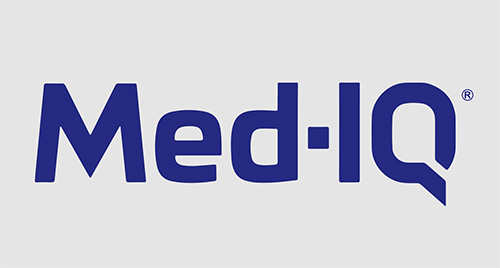Med-IQ Online Learning Center
KAMMCO partners with Med-IQ to offer online risk management programs for insured physicians, nurses, hospital administrators, risk managers, and others involved in the delivery of quality healthcare.

What is Med-IQ?
Med-IQ is KAMMCO's online education parter. Med-IQ, offers a broad range of specialty-specific continuing education courses designed for busy healthcare professionals. Med-IQ courses are available 24/7, allowing you to learn at your convenience, and are grounded in real-world medical professional liability cases to ensure practical and actionable insights.
Med-IQ Login & How-To's
If you have any trouble accessing Med-IQ, contact Connie Christian at cchristian@kammco.com.

KAMMCO Member Benefits
Eligible KAMMCO members who complete at least one of the 2025 Med-IQ courses, by September 30, 2025, will earn a 2% “risk management” policy credit for their 2026 policy renewal.
KAMMCO members earn free continuing education credits (CME or CNE) by completing Med-IQ courses. KAMMCO covers the fees as a member benefit.
Course Accreditation
Med-IQ is accredited to provide both contact hours for nurses and continuing medical education for physicians. The course's type and amout of credit are indicated on the Med-IQ website's "My Courses" and "Course Introduction" pages.
CME for Physicians
Med-IQ is accredited by the Accreditation Council for Continuing Medical Education (ACCME) to provide continuing medical education for physicians.
Nursing Contact Hours
Med-IQ is accredited with distinction as a provider of continuing nursing education by the American Nurses Credentialing Center's Commission on Accreditation.
2025 Med-IQ Course List for KAMMCO Members
Classroom 1: Surgical Specialties/APPs
- Risk and Safety Issues
- Patient-Centered Pain Assessment
- Strategies for Preventing and Managing Dismissals
- Enhancing the Accuracy and Integrity of EHR Documentation
- Enhancing Communication to Optimize Care Coordination
- Health Equity: Confronting Bias in the Treatment of Non-Native Speakers of English
Classroom 2: Non-Surgical Specialties/APPs
- Risk and Safety Issues
- Disparities in the Treatment of Opioid Use Disorder
- The Risk We Fail to See
- Enhancing Communication to Optimize Care Coordination
- Strategies for Preventing and Managing Dismissals
- Health Equity: Confronting Bias in the Treatment of Non-Native Speakers of English
Classroom 3: Emergency MD/APPs
- Risk and Safety Issues
- Safe Passage
- The Risk We Fail to See
- Patient-Centered Pain Assessment
- Exploring the Risk: Supervising Physicians and Medical Residents
- Enhancing Communication to Optimize Care Coordination
Classroom 4: Nursing
- Young Minds Matter: Addressing Pediatric Mental Health
- The Risk We Fail to See
- Health Equity: Confronting Bias in the Treatment of Non-Native Speakers of English
- Safe Passage
- Enhancing Communication to Optimize Care Coordination
- Enhancing the Accuracy and Integrity of EHR Documentation
Classroom 5: Long-Term Care and Non-MDs
- Avoiding Misconduct Allegations: Chaperone, Communication and Documentation
- Patient-Centered Pain Assessment
- Enhancing Communication to Optimize Care Coordination
- Enhancing the Accuracy and Integrity of EHR Documentation
- The Who, Why, and What of Workplace Violence
- Weighing the Evidence and Impact of Obesity Bias
*Courses in yellow should meet the Kansas State Board of Healing Arts "Category III" continuing education requirement.
